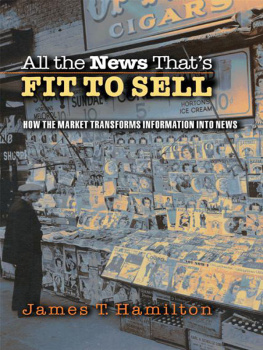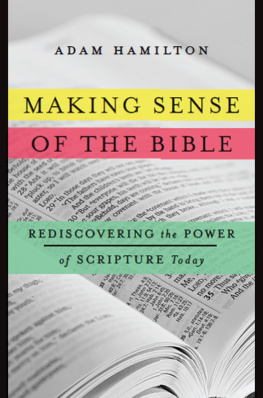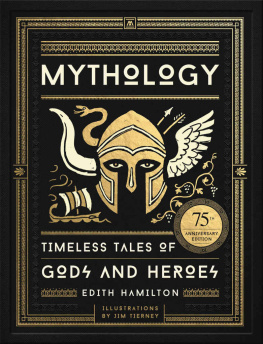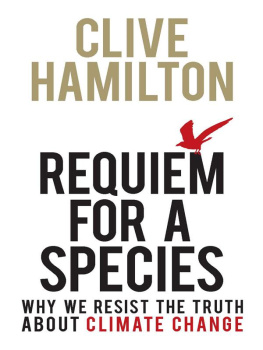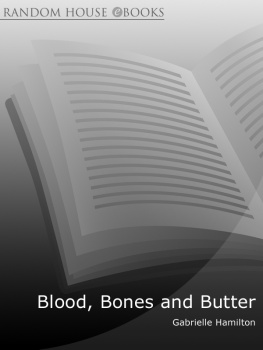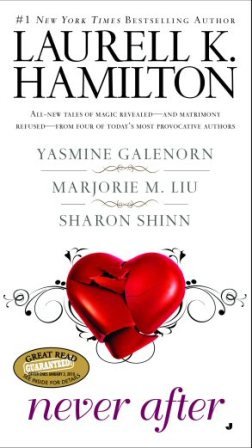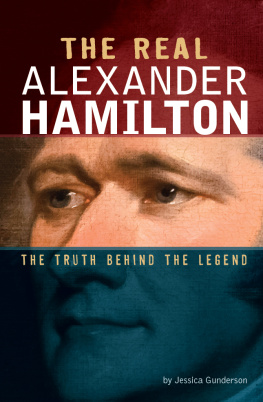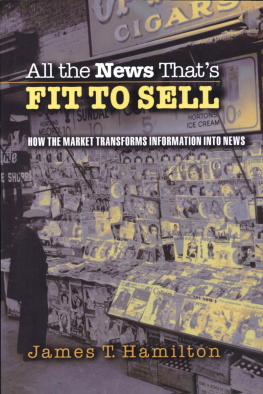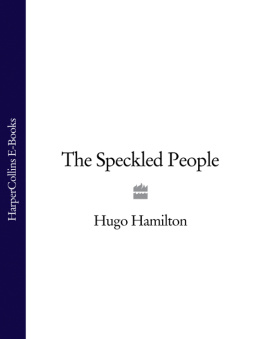Hamilton - All the News Thats Fit to Sell
Here you can read online Hamilton - All the News Thats Fit to Sell full text of the book (entire story) in english for free. Download pdf and epub, get meaning, cover and reviews about this ebook. year: 2011, publisher: Princeton University Press, genre: Business. Description of the work, (preface) as well as reviews are available. Best literature library LitArk.com created for fans of good reading and offers a wide selection of genres:
Romance novel
Science fiction
Adventure
Detective
Science
History
Home and family
Prose
Art
Politics
Computer
Non-fiction
Religion
Business
Children
Humor
Choose a favorite category and find really read worthwhile books. Enjoy immersion in the world of imagination, feel the emotions of the characters or learn something new for yourself, make an fascinating discovery.
All the News Thats Fit to Sell: summary, description and annotation
We offer to read an annotation, description, summary or preface (depends on what the author of the book "All the News Thats Fit to Sell" wrote himself). If you haven't found the necessary information about the book — write in the comments, we will try to find it.
All the News Thats Fit to Sell — read online for free the complete book (whole text) full work
Below is the text of the book, divided by pages. System saving the place of the last page read, allows you to conveniently read the book "All the News Thats Fit to Sell" online for free, without having to search again every time where you left off. Put a bookmark, and you can go to the page where you finished reading at any time.
Font size:
Interval:
Bookmark:
HOW THE MARKET TRANSFORMS INFORMATION INTO NEWS
James T. Hamilton
PRINCETON UNIVERSITY PRESS PRINCETON, NEW JERSEY
Copyright 2004 by Princeton University Press
Published by Princeton University Press, 41 William Street, Princeton, New Jersey 08540
In the United Kingdom: Princeton University Press, 3 Market Place, Woodstock, Oxfordshire
OX20 1SY
All Rights Reserved
ISBN: 0691-11680-6
Library of Congress Cataloging-in-Publication Data
Hamilton, James, 1961
All the news thats fit to sell: how the market transforms information into news / James
T. Hamilton.
p. cm.
Includes bibliographical references and index.
ISBN 0691-11680-6 (alk. paper)
1. Television broadcasting of newsUnited States. 2. Television broadcasting of newsEconomic aspectsUnited States. 3. PressUnited States. 4. PressEconomic aspectsUnited States. I. Title.
PN4888.T4H355 2004
070.195dc21 2003042894
British Library Cataloging-in-Publication Data is available
This book has been composed in Minion Typeface with American Typewriter display
Printed on acid-free paper.
www.pupress.princeton.edu
Printed in the United States of America
10 9 8 7 6 5 4 3 2 1
WHO ALWAYS BRINGS GOOD NEWS
LIKE THE IOURNALISTS I study, I have benefitted greatly from helpful sources, assistants, editors, and readers. Joe Kalt first sparked my interest in media economics and introduced me to the study of rational ignorance. I learned a great deal from conversations about the media with colleagues at Duke, including Sara Beale, Joel Fleishman, Bruce Jentleson, Fritz Mayer, Ellen Mickiewicz, David Paletz, and Chris Schroeder. As a visitor at the Kennedy Schools Joan Shorenstein Center on the Press, Politics, and Public Policy I received many helpful suggestions from Alex Jones, Tom Patterson, and the students in my media economics class. I especially appreciate the time and insights of people who read drafts of the book: Larry Bartels, Matthew Baum, Phil Cook, Tyler Cowen, Jack Hamilton, and Markus Prior. Komal Bazaz and Chi Leng provided expert research assistance. The book also benefitted greatly from the efforts and insights of Lucinda Fickel, who worked as a research assistant for four years on the project. Tim Sullivan and Peter Dougherty at Princeton University Press provided very helpful advice on how to revise (and rename) the book. I owe a continuing debt to my parents, who weekly sent me clippings from press articles about the media. My wife Nancy gave me the freedom to claim all forms of media consumption, even channel surfing, as research. This book is dedicated to my son Matthew, who taught me to see the media (and many other aspects of life) in a new light.
WHO KILLED HARD NEWS? If Dateline or the Daily News were covering the demise of serious reporting about public affairs, this might be the headline. The question evokes many elements of a good storyan air of mystery, a tinge of violence, a hunt for a perpetrator. Reporters writing about problems with the news media like to focus on such human interest angles. Tales of greed, stupidity, and conspiracy make good copy. Yet as intriguing as profiles of media moguls and network anchors may be, they ultimately miss defining the main determinants of news. This book shows that the news is principally produced by market forces and shaped by the particular economics of information goods.
The idea that a special set of economic circumstances governs media markets is not universally accepted. As chairman of the Federal Communications Commission (FCC) in the 1980s, Mark Fowler declared that television was simply a toaster with pictures and held that the same market mechanisms that worked for appliances worked for television broadcasting. Rejecting concerns about the dearth of public affairs or educational programming, Fowler emphasized that media content flows from the types of preferences people express in the marketplace. As he put it, The publics interest, then, defines the public interest. When asked in 2001 about the digital divide, the gap in Internet access and use across demographic groups in the United States, FCC Chairman Michael Powell noted, I think theres a Mercedes divide. Id like one, but I cant afford it In other words, markets are markets; the same principles that govern the sale of cars and toasters also work well in newspaper, television, and Internet markets. I disagree with this assessment. My goal in writing this book is to demonstrate how the specific economic characteristics of information goods affect both the supply and demand of news products.
A brief look at a daily newspaper reveals many of the incentives that affect news markets. My consumption of the newspaper does not prevent you from consuming the same account of events. Once a paper publishes, the knowledge generated by its reporters circulates widely, even to those who have not paid to read the paper. There are many ways the product could be assembledjust take a look at the same edition of any number of paperswith a focus on particular types of stories, formats, or political viewpoints. You cannot really know what is in an edition until you consume part of it, since events change daily. This means a paper will try to establish a brand name for a particular style and approach to the news. The cost of putting together the first copy is high, since the efforts of numerous reporters and editors are required to produce the news. But additional copies are relatively low in cost, because they involve only the cost of paper and distribution; these distribution costs approach zero for editions posted on the Internet. The stories readers choose to look at in a days edition will depend on what they personally find interesting, what information may help them in their jobs, or what products they are thinking about buying. While society as a whole might benefit if readers followed news of politics and government, stories about public affairs may often go unread or even unwritten. The small chance that an individual readers political action can influence events makes it unlikely he or she will search out the information helpful in making a voting decision.
The logic of these incentives explains many outcomes in media and politics. People remain rationally ignorant about the details of public policy because they have such a low probability of influencing the course of events. Reporters and editors do not invest in learning about public affairs since the labor market provides little reward for these skills. News about government will be underprovided and underconsumed, even as these trends are noted and bemoaned. The high fixed costs of putting together the news (the cost of that first newspaper copy) limits the variety offered, which means consumers will be dissatisfied with media products since their exact, ideal combinations of style and substance will not necessarily be met. The chase for additional consumers means that content will often reflect the preferences of those least interested in hard news, rather than the interests of loyal readers and viewers more interested in public affairs. The need to establish consistent expectations about content pushes news outlets to cover stories in predictable ways and to use personalities as a way to build brand recognition. Competitors ability to confirm and appropriate a story once an idea is circulated reduces the incentives for journalists to spend large amounts of time on original, investigative reporting. The difficulties of translating the public benefits from excellent news coverage into private incentives for owners or reporters can leave stories about government undone.
Font size:
Interval:
Bookmark:
Similar books «All the News Thats Fit to Sell»
Look at similar books to All the News Thats Fit to Sell. We have selected literature similar in name and meaning in the hope of providing readers with more options to find new, interesting, not yet read works.
Discussion, reviews of the book All the News Thats Fit to Sell and just readers' own opinions. Leave your comments, write what you think about the work, its meaning or the main characters. Specify what exactly you liked and what you didn't like, and why you think so.

